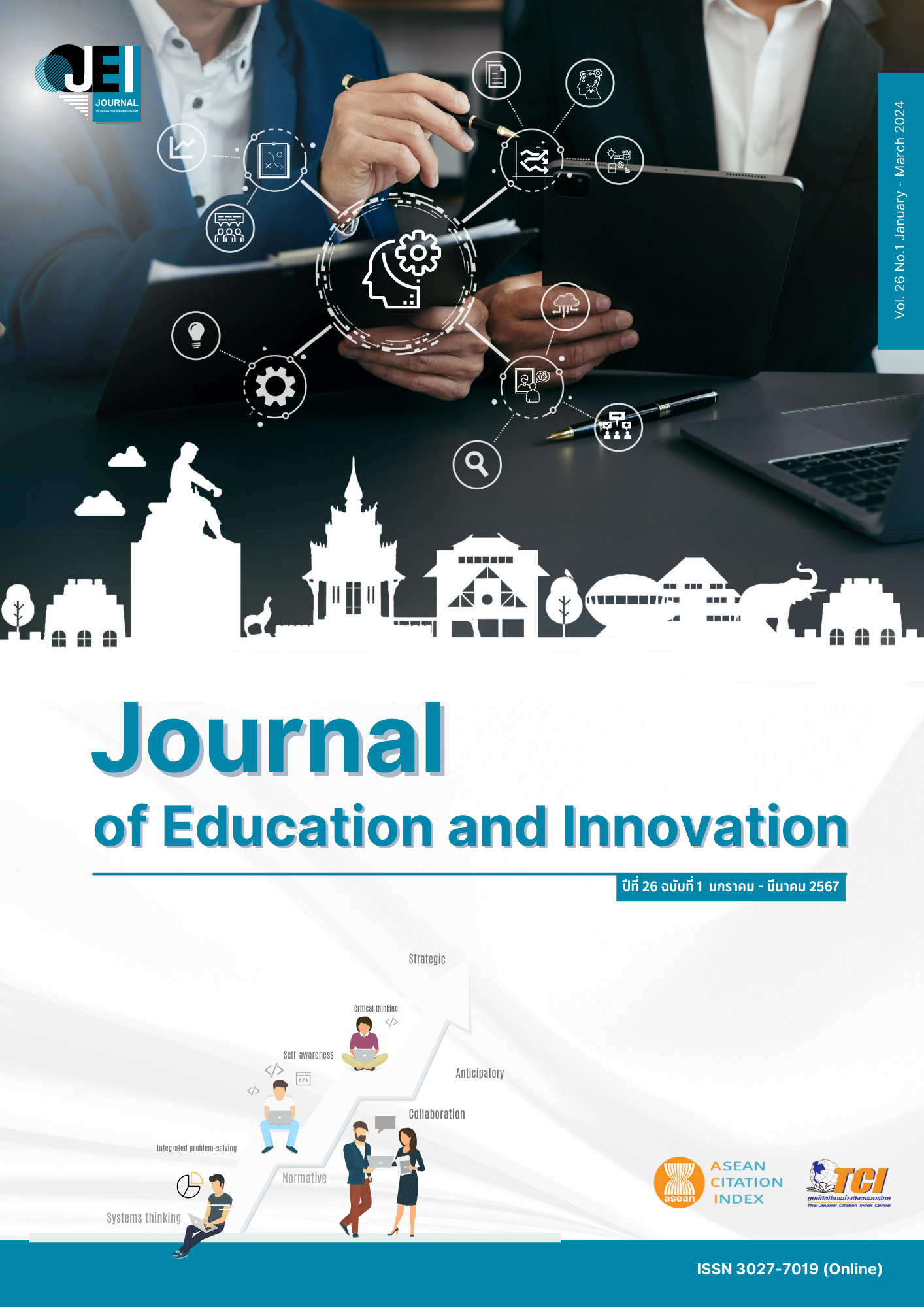THE DEVELOPMENT OF MEASUREMENT INSTRUMENT FOR BASIC EDUCATION TEACHERS’ MULTITASKING SKILLS IN THAILAND
Main Article Content
Abstract
The purposes of this research were 1) to develop measurement instrument for basic education teachers’ multitasking skills in Thailand; and 2) to examine the quality of measurement instrument for basic education teachers’ multitasking skills in Thailand. The sample were 576 teachers in basic education from 6 regions in Thailand using multistage random sampling. Data were collected by 5 rating scale for measurement instrument for basic education teachers’ multitasking skills (23 items). The data were analyzed for the quality of measurement instrument, content validity, discrimination, construct validity by Confirmatory factor analysis, and reliability. The research findings were as followed:
1. Measurement instrument for basic education teachers’ multitasking skills was 5-point rating scale consisted of 3 dimensions, 24 items: 1) Time management skills consisted of 9 items, 2) Problem solving skills consisted of 7 items, and 3) Social skills consisted of 8 items.
2. The results of the quality inspection of the measurement instrument for basic education teachers’ multitasking skills found that the Content Validity was examined by experts (IOC = .60 - 1.00). The Discrimination ranged between .465 - .753 and Reliability Coefficients had .911. It also had Construct Validity as shown by the model fit with the empirical data (Chi-square (180, N = 576) = 210.131, p = .062, CFI = .996, TLI = .993, RMSEA = .017, SRMR = .025). The factor loading ranged from .081 to .836 and it had a significant at the .05 level. The result found that measurement model of basic education teachers’ multitasking skills had Construct Validity and R-square ranged from 77.70% to 84.40%.
Article Details

This work is licensed under a Creative Commons Attribution-NonCommercial-NoDerivatives 4.0 International License.
The owner of the article does not copy or violate any of its copyright. If any copyright infringement occurs or prosecution, in any case, the Editorial Board is not involved in all the rights to the owner of the article to be performed.
References
Brante, G. (2009). Multitasking and synchronous work: Complexities in teacher work. Teaching and Teacher Education, 25(3), 430-436.
Buser, T., & Peter, N. (2012), Multitasking, Experimental Economics.
Goffin, R. D. (2007). Assessing the adequacy of structural equation model: Golden rules and editorial policy. Personality and Individual Differences, 42, 831-839.
Gökel, Ö., & Dağli, G. (2017). Effects of social skill training program on social skills of young people. Eurasia Journal of Mathematics, Science and Technology Education, 13(11), 7365-7373.
Hair, J. F., Anderson, R. E., Babin, B. J., & Black, W. C. (2010). Multivariate data analysis: A global perspective. Upper Saddle River, NJ: Pearson.
Kelloway, E. K. (2015). Using Mplus for structural equation modeling; A researcher’s guide. CA: Sage Publications.
Kubheka, P. P. (2018). Analyzing the preparedness of Office Management & Technology graduates for multitasking in the workplace (Doctoral dissertation). South Africa: Durban University of Technology.
Nadinloyi, K. B., Hajloo, N., Garamaleki, N. S., & Sadeghi, H. (2013). The study efficacy of time management training on increase academic time management of students. Social and Behavioral Sciences, 84(1), 134-138.
Sahler, O. J. Z., Askins, M. A., Dolgin, M. J., & Phipps, S. (2017). Problem-solving skills training for everyday living. Retrieved from http://www.healthpolicyinstitute.pitt.edu.pdf
Schumacker, R. E., & Lomax, R. G., (2010). A beginner’s guide to structural equation modeling (3rd ed.). New Jersey: Lawrence Erlbaum Associates.
Steiger, J. H. (2007). Understanding the limitation of global fit assessment in structural equation modeling. Personality and Individual Differences, 42, 893-898.


